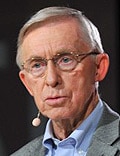The number of homeless people in Utah dropped from 2000 to fewer than 200 — or 91% — during the first 10 years of an ambitious statewide program to eliminate chronic homelessness and curb medical and public costs.
The program, Housing First, connects homeless people with permanent rental housing before they receive any other services, explained Lloyd Pendleton, director of Utah's Homeless Task Force.

Lloyd Pendleton (Photo courtesy of TEDMED)
He described the experience in Utah during a TEDMED 2016 talk in Palm Springs, California.
People who are chronically homeless, as opposed to those who are episodically or temporarily homeless, make up only about 15% of the total homeless population, but they are the most expensive, Pendleton explained.
"They can consume 50% to 60% of homeless resources available in a community," he reported. "In addition, they can cost the community $20,000 to $45,000 a year per person" in services related to addictions, the use of emergency medical technicians, emergency department visits, interactions with police, and jail time.
The program makes sense for many reasons, Pendleton said, including the fact that it is less expensive to provide housing than to absorb those related costs.
The residents must pay 30% of their income or $50 a month, whichever is greater, "so there is some accountability," he told Medscape Medical News. Although they can be evicted for not paying rent, case managers work carefully with them to avoid that. They don't have to be clean and sober before they move in.
"These models meet people where they are, not where we are or where we think they should be," he said.
The program came out of a 2003 federal government initiative that invited cities and states to develop a plan to end chronic homelessness in a 10-year period. Utah accepted the invitation and was the first to take the program — that had been successful in New York City in the 1990s — statewide.
The Homeless Task Force started by conducting a Housing First pilot with 17 of the people most entrenched in homelessness. All 17 were still housed 22 months later, Pendleton reported.
"We became believers and built hundreds of units over the next 10 years, leading to the reduction of 91%," he said.
Pendleton said he attributes the success of the program to having "great champions," all over the state, in business, nonprofits, medicine, and government.
"You need people at a high enough level that they can change the priority of funding and policies and ordinances. The state, the county, the city, service providers, the medical profession, and the housing authority all needed to be part of the solution," he said.
Boston Houses All Homeless Veterans in a Year
Boston saw similar early results using the Housing First approach. Less than a year into the city's plan to end chronic and veteran homelessness by 2018, the city reported that it had effectively ended chronic homelessness among veterans by housing more than 650 people.
The efforts of the Public Health Commission were supported by Friends of Boston's Homeless, which filled in funding gaps, said Marianna Bucina Roca, executive director of the nonprofit organization.
The idea is to get people off the streets quickly, so funds are needed to pay security deposits and rental gaps and to secure basic furniture and household items, she told Medscape Medical News.
The city is well on its way to getting all chronically homeless people into housing, Bucina Roca reported.
"There were 650 chronically homeless individuals identified in January 2015 and, as of now, it's less than 400," she said.
When homeless people have an address and a shower and a place to wash clothes, employment becomes easier and services are easier to organize. In other programs, housing is a reward earned after other steps have been completed.
When people have a home, "all of a sudden, the chaos is removed from their lives," she said. "They can stabilize and focus on health and mental health issues. They can make appointments and they have a place to keep their medications."
Other programs that coordinate access to services are working in collaboration with Housing First to prevent a new generation of homelessness from starting in Boston.
Bucina Roca said that although "other approaches didn't work for decades," she is confident that the city will meet its 2018 goal.
Mr Pendleton and Ms Bucina Roca have disclosed no relevant financial relationships.
TEDMED 2016. Presented December 1, 2016.
Medscape Medical News © 2016 WebMD, LLC
Send comments and news tips to news@medscape.net.
Cite this: State Cuts Medical, Public Costs by Helping Homeless - Medscape - Dec 02, 2016.











Comments